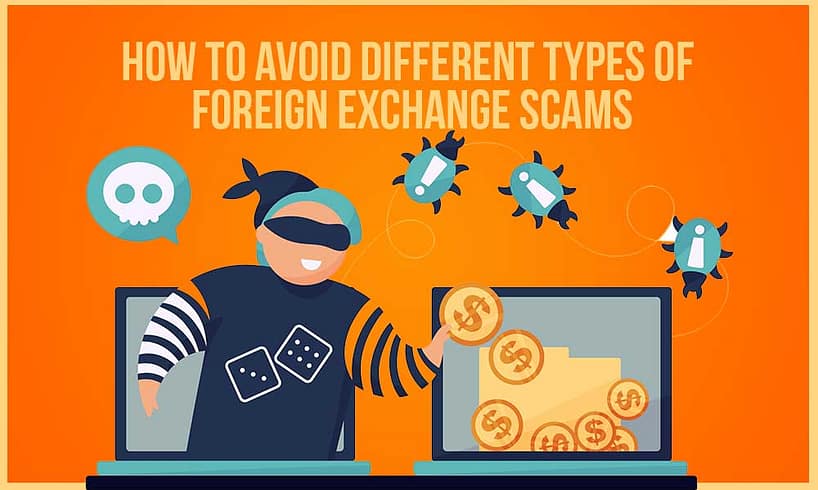
The acceleration of digital modernization has made scammers powerful in every field. The platform of foreign exchange scams is no exception. Foreign exchange is a passive income process where traders exchange currencies in order to make a profit. Foreign exchange traders trade currencies with the help of global financial markets. In this system of foreign exchange, the traders’ income depends on their accuracy of predictions, as they determine when the value of a currency will be more potent compared to another.
Many investors choose foreign exchange as an investment option rather than stocks and crypto currencies, as scammers cannot influence the value of a currency. However, some scammers find other ways to fool foreign exchange traders for their own profit. To avoid falling into the traps of forex scams, a forex trader should always be well knowledgeable about the strategies these scammers own. Some of the tactics foreign exchange scammers own are discussed in this article.
Foreign exchange scams occur due to,
- Unlicensed Brokers,
- Fraudulent Websites,
- Blacklisted Brokers,
- Newbie Traders,
- Forex Robot Scams,
- Signal Scams,
- Pyramid Scheme,
- Ponzi Scheme,
- Delaying Withdrawal,
- Managed Account
Unlicensed Brokers:
It would be best if you only trusted the brokers who are officially regulated by the regulatory authorities, who ensure that the brokers that are registered to them follow specific guidelines. Moreover, these regulatory authorities are accountable for the allegations made against brokers who are registered with them. They also provide the brokers with license no. etc. As these aspects help prove their legitimacy, some brokers fictitiously claim that they are registered with these regulatory authorities and possess a license number issued by them.
It is advisable for foreign exchange traders to search their forex brokers’ names and license numbers on the website of the regulatory body they claim to be registered with. If their names and license numbers are not available there, chances are high that the broker they are dealing with is a scammer.
Fraudulent Websites:
Some fictitious foreign exchange brokers develop fraudulent websites that resemble existing, genuine forex brokers’ websites, imitating their domain names and the design of their website. Foreign exchange scammers target the existing clients of the broker as well as random people. They even copy their license number as well as mention the names of their regulatory bodies to fool foreign exchange traders. Scammers generally garner their personal information by utilizing these fraudulent websites and use them for their own profit.
Blacklisted Brokers:
Many brokers get boycotted for committing forgery, and many companies maintain a record of these foreign exchange brokers on their websites. These listed websites are readily available on the internet. Therefore, foreign exchange traders can search for brokers and their license numbers on these websites before dealing with them. It’ll assist them in avoiding the brokers who are found on those lists.
Also Read: Finance blog
Newbie Traders:
The primary target of a foreign exchange broker are rookie traders, who have less experience or no experience at all, as they are more prone to getting scammed. These imprudent forex traders are easy to manipulate. Therefore traders need to be more careful when they are new in this field and should calculate every step they take.
Forex Robot Scams:
A forex robot is an automated trading machine that makes market calculations and suggestions to the foreign exchange traders about when it is the best time to exchange currencies, finally making a profit. They make these predictions based on foreign exchange market price movements. Forex traders buy these forex robots so that they can use them for their own benefit.
However, foreign exchange robot scams occur when robot sellers garner money from the buyers, promising them to provide the product they need, but do not do so and instead run away with their money. Forex robot scams also occur when these robots do not function correctly and make false predictions leading the traders to a loss.
Signal Scams:
Signals in the field of foreign exchange refer to notification alerts. These signals serve the same purpose as forex robots; making predictions based on forex market price movement and then informing their customers. Foreign exchange traders only need to subscribe to these signals in order to use them to make profits in this field. Forex traders just need to pay the service providers on a weekly or monthly basis to avail of their services.
Signal scams occur when traders do not get a proper response even after paying a considerable amount of money. Sometimes the signal service providers do not even notify the traders based on market price movement but set it as default to fool them into garnering money.
Pyramid Scheme:
Fraudulent foreign exchange brokers utilize pyramid schemes to fool traders. In pyramid schemes, scammers entice forex traders to be a part of them and then ask their members to refer more people if they want to make profits. In the Pyramid scheme, initiators want the members to make a deposit while joining. Scammers here take a part of the money they garner from each new member and claim to provide a portion of the money to the other members too. The main source of income here in this scheme is every new member. Needless to say that it fails in the long run. A forex trader should be aware of the fact that these schemes are unsustainable and are also unlawful.
Ponzi scheme:
The Ponzi scheme is where the initiator persuades the foreign exchange traders to make deposits at the time of joining by luring them with a high rate of returns at low or no risk. The director of the scheme claims that they are making a profit by harnessing the investment in genuine business organizations, but in reality, they pay old investors from the deposits of more recent investors. However, forex scams emerge when the director of a Ponzi scheme persuades investors through a forex trading expert.
Delaying Withdrawal:
Ingenious foreign exchange brokers sometimes suspend investors’ trading accounts or deny their account withdrawal. These situations can be considered as Forex scams. Moreover, brokers decline traders’ fund withdrawal requests and cease all contact when foreign exchange traders try to get in touch.
Managed Account:
Fraudulent forex brokers who perpetrate forex scams sometimes recommend foreign exchange traders to invest through a managed fund. They do as instructed and ultimately traders get much less control over their funds when they invest through a managed account. Brokers with managed accounts exploit traders’ investments for extra profits. Sometimes brokers make it impossible for the traders to track the money in their managed account.
Acquisitive, unethical foreign exchange scammers scam forex traders in many ways. Foreign exchange traders should opt for a skeptical approach to stay ahead of the threats posed by these fictitious brokers. A skeptical approach is where you verify any provider before trusting them. Moreover, research makes traders more knowledgeable, making them understand the nature of strategies utilized by the forex scammers, and it also helps them prevent scammers’ evil intentions.
After taking all the measures, if you still get scammed, remember that there are plenty of organizations that help victims in recovering their funds lost in such scams. You can readily find them on the internet and seek their help.






